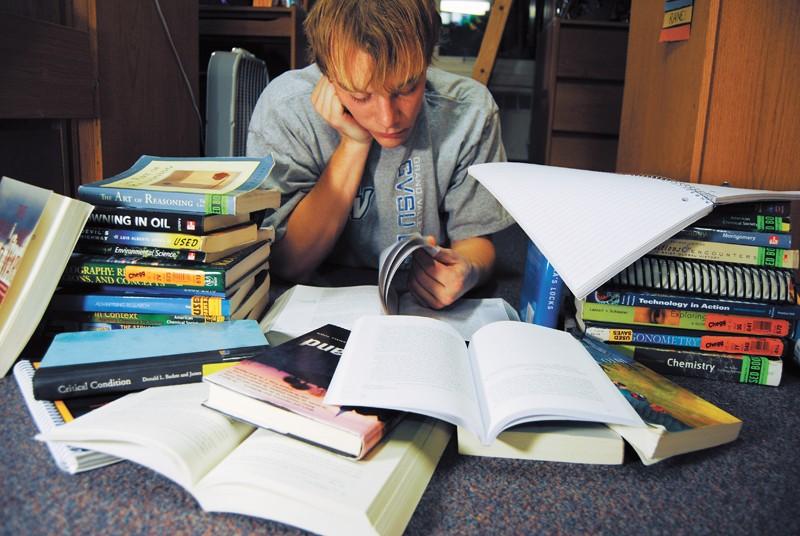Managing your test anxiety

GVL / Archive Students can easily become overwhelmed by the amount of work school entails
Feb 7, 2013
Throughout college, the stress of taking exams can seem like too much. When it gets overwhelming, it’s important to learn different techniques on how to keep anxiety under control so it doesn’t prove debilitating.
The Student Academic Success Center at Grand Valley State University held a workshop Feb. 4 on handling test anxiety.
During the workshop, Assistant Director of SASC Jackie Rautio separated the discussion into four components: cognitive restructuring, efficient learning strategies, relaxation techniques and how to have a balanced life.
For cognitive restructuring, Rautio said it’s important for college students to identify their negative thoughts so they can challenge them.
Rautio said some common negative thoughts that may occur are, “I just want to get it over with,” “I hate this,” or “If I fail this test, then what?”
“With negative self-talk, it can be hard to calm yourself down after you’re worked up,” she said. “Students want to avoid this with cognitive restructuring.”
Rautio added that many college students who have test anxiety have irrational thoughts such as, “If I fail this test, I’m going to get kicked out of GVSU,” or “I’m just (not) smart enough.”
In order to combat these thoughts, she said to think rational thoughts instead. One example is, “How I perform on a test doesn’t determine my value as a person.”
“If you start experiencing test anxiety, acknowledge your perception of the situation,” Rautio said. “We are all creatures of habit and it’s important to start identifying your negative thoughts and catch yourself. That’s a success when you can catch these thoughts quickly and change them, and that takes practice and repetition.”
Rautio also said students should use efficient learning strategies to combat test anxiety. Some tips for preparing for exams are to start studying seven days before the test, practice with flash cards, review material within 24 hours and take good notes. Students should also review their tests after they’re returned.
“Students need to look back after they take a test to get a clue on what they did wrong and how they can improve the next time,” Rautio said.
Reviewing how often you studied, what strategies helped most, what strategies helped least, as well as a realistic plan for improving on the next exam are all components included in the post-exam analysis.
Another way to alleviate stress is to use relaxation techniques. Rautio said there are several that students can utilize when preparing for an exam.
“You can do deep breathing before you study, all it takes is a minute,” she said. “This helps to let the brain and muscles relax.”
Having a balanced life is also crucial when managing test anxiety.
“If you don’t have something that you do outside of school, find something,” Rautio said. “It’s a good intention to just focus on studying, but it just doesn’t work. You don’t get instant gratification from school; you need to find something that makes you feel good immediately.”
Rautio added students should balance their physical, emotional, intellectual and social health, because having variety in all these areas will help during stressful situations.
If students need help with school or their emotional health, Rautio recommended they use the Counseling and Career Development Center, SASC or the tutoring center.
For more information, contact SASC at 616-331-3588, the counseling center at 616-331-3266 and the tutoring center 616-331-3451.





















